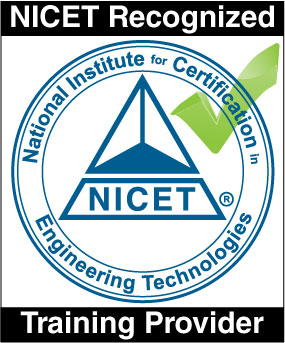
NICET Concrete Testing Certificate Preparatory Course

HCCC is proud to announce the Construction Management program has received an Advanced Technology Education grant award of $300,000 from the National Science Foundation (NSF).

These courses prepare students for the National Institute of Certified Engineers and Technicians (NICET) Level I & II Certifications, a nationally recognized and industry-wide accepted program in the field of Concrete Testing. The NICET Certifications are most required by local and state jurisdictions, and by federal agencies. The National Institute of Certified Engineers and Technicians has recognized our institution as a recognized training provider for NICET Certifications.
The purpose of Concrete Testing for construction is to determine the suitability of the concrete for the type of construction to be done. NICET Certification levels outline a career path for advancement from entry to senior level. Level I is for technicians performing routine inspection and testing tasks under daily supervision. Level II is for technicians who need to work more independently. These certifications are designed for field and laboratory technicians who test and inspect concrete work.
Certification in Concrete Testing helps students understand changing trends in the field of inspection, testing, safety, and environmental aspects of today’s modern construction.
NICET Certification Information
NICET Certification is one of the most prestigious and extensive vocational tests conducted across the United States of America for professionals in the Construction Industry. Certification often influences hiring, retention, promotion, and contracting decisions. It is equally beneficial for employers as it is for employees.
The National Institute of Certified Engineering Technicians (NICET) offers certifications in multiple areas at a different level of academic/experience levels related to a Civil Engineering Technology Program; The following are the major work areas where certification programs are offered:
Construction Materials Testing:
Asphalt, Concrete & Soils
Transportation Construction Inspection:
Highway Construction Inspection
NICET Certified Technicians are defined as “hands-on” members of the engineering team who work under the direction of Engineers, Scientists, and Technologists. They have knowledge of the components, operating characteristics, and limitations of engineering systems and processes particular to their area of specialization.
NICET Level I Concrete Testing Certificate Preparatory Course
- Develop a broad knowledge and understanding of means and methods employed in construction and the significance of concrete’s role
- Identify issues and propose mitigation measures
- Inspect to ensure the suitability of the material
- Determine the quality of materials used through testing
- Recognize an inspector's duties for providing quality and safe products
Personal and Worksite Safety:
- Determine and wear personal protective equipment (PPE)
- Identify and report task-specific hazards
Plans and Specifications:
- Identify locations on-site from locations on plans
- Identify test frequencies and requirements
Sampling of Concrete Mixes and Components:
- Collect samples of plastic concrete
- Collect samples of mixed components (including labeling)
- Collect masonry units (e.g., block or brick)
- Document source of samples (e.g., aggregates or plastic concrete)
- Document placement location for plastic concrete
- Document mix information
Concrete Mix Sample Preparation, Storage and Transportation:
- Prepare samples for strength testing
- Transport samples of plastic concrete to on-site testing location
- Wet sieve plastic concrete
- Site cure samples
- Transport hardened concrete samples to the laboratory
- Lab cure prepared specimens
- Reduce samples to testing size
Field and Laboratory Testing of Concrete Mixes and Components:
- Determine temperature of plastic concrete
- Perform slump tests
- Determine air content pressure method
- Determine air content volumetric method
- Determine air content gravimetric method
- Determine unit weight
- Cast strength specimens
- Perform aggregates gradation tests
- Perform moisture content tests
- Perform compressive strength tests of concrete cylinders
Communication of Results:
- Collect required test data for reports
- Document field observations
- Complete test forms and related reports
- Report results to supervisor
- Assess reasonableness of results
Equipment Calibration and Maintenance:
- Verify lab testing equipment is calibrated for Level I tests
- Verify field testing equipment is calibrated for Level I tests
- Verify dimensions of field equipment
- Verify equipment operation for Level I tests
NICET Level 1 Certification (Preparatory Course)
2025 dates will be announced soon!
(Join our waitlist by clicking on the register button below to be the first notified
when new classes are scheduled.)
ONLINE COURSE
No Prerequisites Required
Total Hours: 32
$375
For more information and registration, please email Alexis Muniz at amunizFREEHUDSONCOUNTYCOMMUNITYCOLLEGE.
Contact Information
Office of Continuing Education
161 Newkirk Street, Room E504
Jersey City, NJ 07306
(201) 360-4224
CEFREEHUDSONCOUNTYCOMMUNITYCOLLEGE